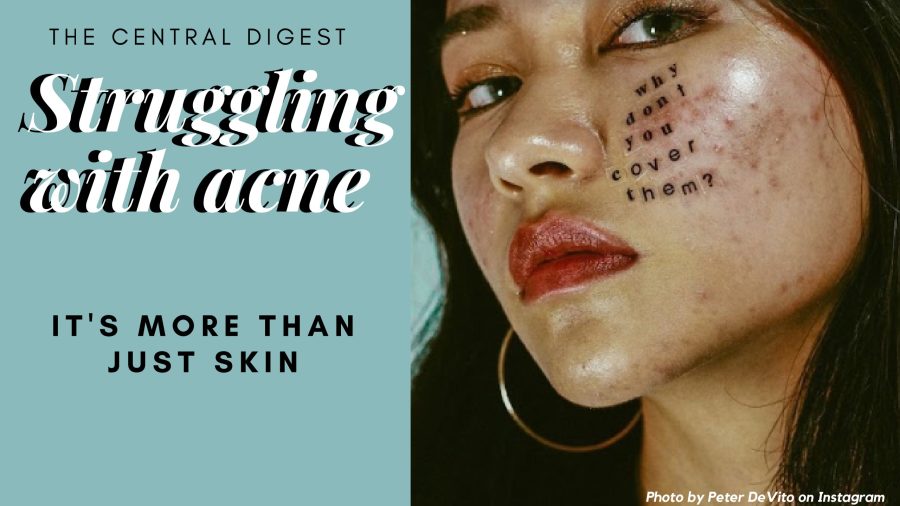How Teens Can Be Confident With Acne
MODEL PICTURED IN FEATURE IMAGE TAKEN BY PETER DEVITO ON INSTAGRAM
Imagine waking up to the sound of your alarm on a Thursday morning. Sleepily getting out of bed, and stumbling over to the bathroom, you notice you have a huge pimple on your forehead. You don’t give it a second thought until you glance at the calendar. Today of all days, it had to be picture day.
“When you’re a teenager, you already feel like everyone’s looking at you anyway. And then when you’ve actually got a definitive reason why they might be looking at you, it just makes it so much worse”.
-Yi Harriet [Healthtalk.org -The Emotional Side of Having Acne]
Coping with Acne
Although acne is a cosmetic issue, it can affect many aspects of your life. Acne may impact your self-esteem, your confidence, your social life, and the way you interact with others.
People often label acne as a “part of life as a teenager” resulting in people not reaching out for medical help sooner. The lack of guidance could leave them feeling unsupported. According to Health Talk, those who had acne during their adolescent years recall it as a somewhat-awkward experience, especially when their peers didn’t have any spots at all. It made them feel jealous of other people with “perfect” skin.
Even though acne has been normalized increasingly throughout each generation, you still may feel insecure about having it. However, your skin doesn’t define who you are as a person. Learning to remain self-assured amid breakouts takes time and initiative. Maintaining a positive mindset is key to building up your confidence.
Focusing On The Positive
Changing the narrative you tell yourself about your skin from negative to positive is a vital place to start. One small thing that you can do to make a difference in your internal monologue is to write a thank-you letter to yourself. It may seem corny but we all need self-appreciation every once in a while. Write down what you’re grateful for about yourself. It doesn’t matter if it’s cheesy, no one else is going to read it. Every characteristic that you love, it’s all significant. You deserve love 100% of the time, it doesn’t matter what you look like.
Curology.com states, “Even if your skin doesn’t always cooperate the way you’d like it to, it does a lot for you every day: it protects you, and it reflects your inner wellness. Just like you, when your skin has its ups and downs, all it needs is a little love and care. It’s amazing what a simple shift in perspective can do!”
Spending More Time With Those Who Appreciate You
Investing your time in the right crowd has a more positive impact on your mental health than you think. Go do something you enjoy with the people who love you. These people will respect you despite your imperfections. Sticking around them may remind you that you are a worthwhile person. Finding supportive figures such as your friends or family can go a long way in helping you cope with acne. Keep in mind that most everyone gets acne in their lifetime, so a vast majority of people will be able to identify with you. Other options include joining an online acne support forum or group.
Asking your peers for advice
Whether you notice it or not, there are other people surrounding you that are struggling through similar insecurities. “You just compare yourself to everyone else that is around you, especially famous people.” An anonymous student at Central High School informed The Digest.
It’s completely okay to ask for advice from friends. In fact, it may come across to that person that you look up to them. They may take it as a compliment, which can improve your relationship with them.
Click here to read an article by Healthtalk.org featuring other teens who struggle with acne and their stories.
Using Non-Comedogenic Products
If you want to stay clear of pimples, make sure to avoid products with comedogenic ingredients. You can do this by looking for products that say “non-comedogenic” on them. Comedogenic ingredients can clog your pores and trigger acne- either by occluding the skin, blocking its glands, or irritating and possibly infecting the hair follicles. Two ingredients that may cause this are coconut oil and cocoa butter.
Improving Your Skincare Routine
Pimples form due to the build-up of oil inside pores. A massive number of people who have acne don’t even maintain a skincare routine, which over time can be harmful and overwhelming to your skin. The base of a skincare routine has three main things: Facial Cleanser, Toner, and Moisturizer. It can be difficult to pinpoint the product that’s the most beneficial so here is a quick guide to each step and how to find out what is best for you.
Facial Cleanser
There are many different types of skin and thus, there are many brands and formulas for face wash. Our personal favorite brands for this are Cerave, Curology, The Ordinary, and Vanicream. Many people put water on their face first before applying the cleanser but using it before the water has been suspected to work better. It can cleanse your pores better without a layer of water getting in its way.
Refer to this chart provided by The New York Times. It depicts what kind of cleanser you should use according to your skin type.

Toner
Think of toner as vitamins for your skin. They are thin liquids that provide extra nutrients. Aesthetician Jordana Mattioli considers toner to be optional: “It can be a good way to add in specific ingredients that you may not have in your other products or add another layer of skin-replenishment.” Toners should be used right after cleansing the face. One toner that we recommend is the: Glycolic Acid 7% Toning Solution
Tip: “‘Applying toner with clean hands is the most efficient. Just pour a few drops in your palm, then swipe it on.’ Or if you prefer, you can pull apart a cotton pad ‘so it’s not so thick before putting toner on it,’ Mattioli advises. Most formulas can be used morning and night, but you might want to use those with exfoliating acids only at night or every other day.” [New York Times -How to Build a Skin Care Routine]
Moisturizer
Using moisturizer daily hydrates and soften the skin. It repairs and avoids symptoms such as flakiness, redness, and eczema. You don’t need a lot of it, we recommend you apply a pea-like amount. Dermatologists recommend using one that is lightweight and water-based in order to avoid clogging up pores. Moisturizers with a built-in-broad spectrum of at least thirty SPF are also strongly advocated. Allure has an amazing article on the 29 best moisturizers with SPF.
Citations:
Verywellhealth.com -Coping With Acne
Verywellhealth.com -Preserve Your Self Esteem Despite Acne
Healthtalk.org -The Emotional Side of Having Acne
Curology.com -Reduce Stress and Breakouts at the Same Time
New York Times -How to Build a Skin Care Routine
Allure- The 29 best moisturizers with SPF
Model pictured in feature image taken by Peter DeVito on Instagram








